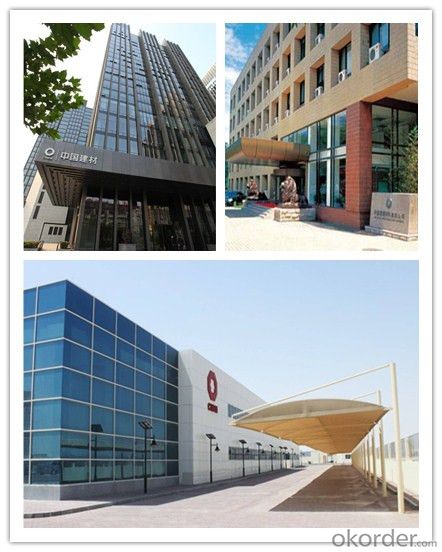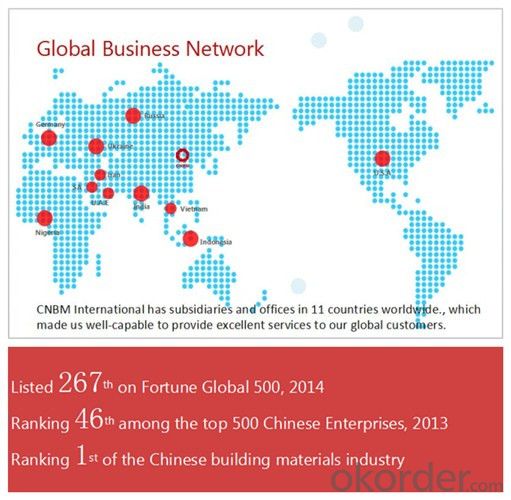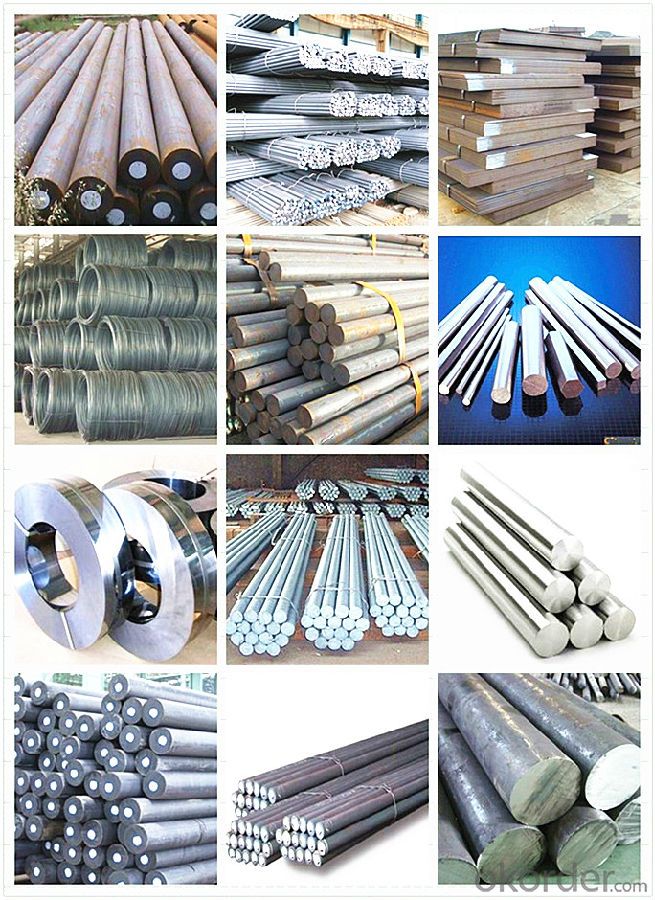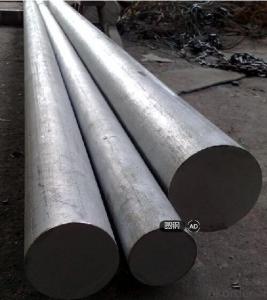4130 Steel Rod/4130 Steel Bar/Alloy Steel Bar
- Loading Port:
- Qingdao
- Payment Terms:
- TT OR LC
- Min Order Qty:
- 5 m.t.
- Supply Capability:
- 100000 m.t./month
OKorder Service Pledge
Quality Product, Order Online Tracking, Timely Delivery
OKorder Financial Service
Credit Rating, Credit Services, Credit Purchasing
You Might Also Like
Item specifice
Type:
Carbon Steel,Spring Steel,Bearing Steel,Gear Steel,Deformed Steel,Stainless Steel,Alloy Steel
Shape:
Steel Coil,Steel Sheet,Steel Wire Rod,Steel Flat Bar,Steel Square Bar,Steel Angle,Steel Round Bar,Steel Billets
Technique:
Hot Rolled,Cold Rolled,Cold Drawn,ERW,Forged,Saw,Extruded,EFW,Spring
Surface Treatment:
Galvanized,Coated,Copper Coated,Color Coated,Oiled,Dry,Chromed Passivation,Polished,Bright,Black,PVDF Coated
Certification:
ISO,SGS,BV,IBR,RoHS,CE,API,BSI,UL
Thickness:
4mm-800mm
Width:
4mm-800mm
Length:
6-12m
Outer Diameter:
4mm-800mm
Net Weight:
100kg
Packaging:
seaworthy packaging
4130 Steel Rod/4130 Steel Bar/Alloy Steel Bar
Detailed Information of 4130 Steel Rod/4130 Steel Bar/Alloy Steel Bar
| Name | Steel Round Bar |
| Shape | Round Bar/Square Bar/Flat Bar/Plate/Wire |
| Standard | GB/ASTM/SAE/AISI/DIN/JIS/EN/BS |
| Surface Treatment: | Black/Peeling/Polished/Machined |
| Delivery Condition: | Hot Rolled or Forged/Peeled or Black Surface |
| Test | SGS/UT 100% Elements Testing |
| Certificate: | ISO/Mill Certificate |
| Service: | 24 hours online service / |
| more than 20 years trading and manufacture | |
| Quality Assurance: | the third party inspection, such as SGS, BV, TUV…etc. is acceptable |
| Packaging Details: | Seaworthy Packaging or as per customer's packing instruction |
Product Overviews of 4130 Steel Rod/4130 Steel Bar/Alloy Steel Bar
| Product Name | Typical Grades | Diameter(mm) | Standard Adopted |
| Carbon Steel | 20 (1020/S20C/C22) | ||
| 40 (1040/S40C/C40) | Ø16-Ø300 | ||
| 45 (1045/S45C/C45) | |||
| Bearing Steel | GCr9 (51100/SUJ1) | ||
| GCr15 (52100/SUJ2/100Gr6) | Ø12-Ø250 | ||
| GCr9SiMn (A485-Gr.1/SUJ3) | GB/SAE/ | ||
| Cr-Mo Steel | 20Cr (5120/SCr420H/20Cr4) | JIS/DIN | |
| 40Cr (5140/SCr440/41Cr4) | Ø12-Ø250 | ||
| 42CrMo(4140/SCM440/42CrMo4) | |||
| Gear Steel | 20CrNiMo | ||
| 20CrMn(5115/SMnC420/20MnCr5) | Ø16-Ø600 | ||
| 20CrNiMo(8620/SNCM220/20CrMiMo2) |
Company Introduction of 4130 Steel Rod/4130 Steel Bar/Alloy Steel Bar
CNBM International Corporation is the most import and export platform of CNBM group(China National Building Material Group Corporation) ,which is a state-owned enterprise, ranked in 270th of Fortune Global 500 in 2015.
With its advantages, CNBM International are mainly concentrate on Cement, Glass, Iron and Steel, Ceramics industries and devotes herself for supplying high quality series of refractories as well as technical consultancies and logistics solution.


| After-sale service | l CNBM provides the services and support you need for every step of our cooperation. We’re the business partners you can trust; you can relax and get on with doing business. |
| l For any problem, please kindly contact us at any your convenient time, we’ll reply you in our first priority within 24 hours | |
| Advantages | l Industry experience over 20 years. |
| l Shipment of goods -More than 70 countries worldwide. | |
| l The most convenient transport and prompt delivery. | |
| l Competitive price with best service. | |
| l High technical production line with top quality products. | |
| l High reputation based on best quality products. | |
Packaging & Delivery of 4130 Steel Rod/4130 Steel Bar/Alloy Steel Bar
| Packaging Detail | Sea worthy packing /as per customer's packing instruction |
| Delivery Detail | 15 ~ 40 days after receiving the deposit |
Products Show

FAQ:
| Are you a trading company or manufacturer? | Manufacturer |
| What’s the MOQ? | 1000m2 |
| What’s your delivery time? | 15-20 days after downpayment received |
| Do you Accept OEM service? | Yes |
| what’s your delivery terms? | FOB/CFR/CIF |
| What's the Payment Terms? | 30% as deposit,70% before shipment by T/T |
| Western Union acceptable for small amount. | |
| L/C acceptable for large amount. | |
| Scrow ,Paybal,Alipay are also ok | |
| Why choose us? | Chose happens because of quality, then price, We can give you both. Additionally, we can also offer professional products inquiry, products knowledge train (for agents), smooth goods delivery, excellent customer solution proposals. |
| What's your available port of Shipment? | Main Port, China |
| What’s your featured services? | Our service formula: good quality+ good price+ good service=customer's trust |
| Where are your Market? | Covering more than 160 countries in the world |
- Q:How is shock-resistant steel used in the production of impact tools?
- Shock-resistant steel is used in the production of impact tools because it has enhanced toughness and can withstand the high impact forces generated during use. This steel is specifically engineered to absorb and distribute the shock and vibrations produced when the tool strikes an object, reducing the risk of breakage and increasing the tool's overall lifespan.
- Q:How does special steel contribute to the energy aftermarket industry?
- The energy aftermarket industry heavily relies on special steel for the production and maintenance of various energy equipment and infrastructure. This type of steel is crucial as it provides durable and high-quality materials. One important application of special steel is in the manufacturing of turbine components like blades, rotors, and casings. These components are essential for power generation, especially in thermal, hydro, and wind energy systems. Special steel possesses exceptional strength, corrosion resistance, and high-temperature stability, ensuring the efficient and reliable operation of turbines even in harsh environments. Moreover, special steel plays a vital role in the construction and upkeep of oil and gas pipelines. These pipelines are responsible for transporting energy resources over long distances and require materials that can withstand extreme pressures, temperatures, and corrosive environments. Special steel grades with enhanced mechanical properties and corrosion resistance are utilized to maintain the integrity and safety of these pipelines, ultimately improving the efficiency and reliability of the energy aftermarket industry. Furthermore, special steel is used in the production of storage tanks, heat exchangers, and various other components employed in the oil, gas, and renewable energy sectors. These components are crucial for storing and processing energy resources and necessitate materials that can endure high pressures, temperature changes, and aggressive chemicals. Special steel grades provide the necessary mechanical properties and corrosion resistance, enabling safe and efficient energy storage and processing. Apart from its material properties, special steel also enables advanced manufacturing techniques like precision machining and welding. These techniques are crucial for producing complex energy equipment and components, ensuring high accuracy, reliability, and efficiency in the production process. This, in turn, leads to high-quality end products that meet the demanding requirements of the energy aftermarket industry. Overall, special steel significantly contributes to the energy aftermarket industry by providing materials with exceptional strength, corrosion resistance, and high-temperature stability. Its utilization in the manufacturing and maintenance of energy equipment and infrastructure enhances efficiency, reliability, and safety, ultimately supporting the growth and sustainability of the industry.
- Q:How does special steel contribute to the aerospace material recyclability?
- Special steel contributes to the aerospace material recyclability by offering high strength, durability, and corrosion resistance properties. These characteristics make it a preferred material for various aerospace components like landing gears, engine parts, and structural elements. When these components reach the end of their life cycle, special steel can be easily recycled and repurposed, reducing the need for new raw materials and minimizing waste. This contributes to a more sustainable and environmentally friendly aerospace industry.
- Q:What are the main characteristics of magnetic steel forgings?
- Magnetic steel forgings possess a multitude of desirable traits that make them highly sought after in numerous industries. Firstly, their exceptional magnetic properties allow for easy magnetization and demagnetization. This renders them suitable for applications that require magnetism, such as electrical motors and generators. Secondly, magnetic steel forgings exhibit remarkable strength and durability. Through the forging process, the steel is compressed and shaped, resulting in a dense and uniform microstructure. This greatly enhances the mechanical properties of the steel, including tensile strength, impact resistance, and fatigue strength. As a result, magnetic steel forgings can withstand heavy loads and harsh operating conditions, making them ideal for demanding applications like automotive components, industrial machinery, and aerospace parts. An additional characteristic of magnetic steel forgings is their exceptional corrosion resistance. The forging process aids in refining the grain structure of the steel, reducing its susceptibility to corrosion and oxidation. This quality is crucial in industries where components are exposed to corrosive environments or high temperatures, such as marine applications or oil and gas equipment. Furthermore, magnetic steel forgings offer excellent machinability and weldability. The forging process not only enhances the mechanical properties of the steel but also improves its machinability, allowing for easy shaping and modification into intricate designs. Additionally, magnetic steel forgings can be readily welded without compromising their integrity, providing flexibility in manufacturing and assembly processes. Lastly, magnetic steel forgings exhibit exceptional dimensional stability. The forging process involves controlled heating and cooling, minimizing dimensional changes and distortions. This ensures that the final product maintains its shape and dimensions, enabling precise fit and compatibility with other components. In summary, magnetic steel forgings possess excellent magnetic properties, high strength and durability, corrosion resistance, good machinability and weldability, and dimensional stability. These characteristics contribute to their versatility and widespread use in various industries, leading to their overall success and popularity.
- Q:What are the thermal conductivity properties of special steel?
- Special steel, also known as alloy steel, exhibits high thermal conductivity properties. This is due to the presence of various alloying elements, such as chromium, nickel, and manganese, which enhance heat transfer. The specific thermal conductivity value of special steel depends on its composition and can vary, but it generally has good heat transfer capabilities.
- Q:How does special steel contribute to the automotive material recycling?
- Special steel plays a significant role in automotive material recycling by providing high-strength and durable components that can be easily disassembled and reused. Its properties allow for effective recycling processes, enabling the extraction of valuable materials from end-of-life vehicles. This contributes to the sustainability of the automotive industry by reducing waste and conserving resources.
- Q:How does special steel perform in erosion applications?
- Special steel is known for its exceptional performance in erosion applications. Its unique properties such as high hardness, corrosion resistance, and wear resistance make it highly suitable for environments where erosion is a common issue. Erosion is the gradual wearing away of a material due to the action of external forces such as abrasion, impact, or cavitation. In applications where erosion is prevalent, such as mining, oil and gas, and chemical processing industries, regular steel may not be able to withstand the harsh conditions and may quickly deteriorate. Special steel, on the other hand, is specifically designed to withstand erosive forces and maintain its structural integrity over an extended period. Its high hardness helps it resist abrasion and prevents the material from wearing down quickly. This makes it ideal for applications involving the movement of abrasive materials or fluids. Furthermore, special steel also exhibits excellent corrosion resistance, which is crucial in erosive environments. It can resist the corrosive effects of chemicals, moisture, and other harsh substances, ensuring the material's longevity and performance. In addition to hardness and corrosion resistance, special steel also offers exceptional wear resistance. It can withstand repeated impacts, high pressures, and sliding contact without significant damage, making it highly effective in erosion-prone applications. This wear resistance helps to minimize downtime and maintenance costs associated with material replacement or repair. Overall, special steel's properties make it a reliable and durable choice for erosion applications. Its ability to resist abrasion, corrosion, and wear ensures that it can withstand the demanding conditions often found in such environments, providing long-lasting performance and reducing the need for frequent replacements.
- Q:What are the different quality control measures for special steel production?
- There are several quality control measures implemented during special steel production, including rigorous inspections at various stages of the manufacturing process, such as raw material testing, chemical composition analysis, and heat treatment verification. Additionally, non-destructive testing techniques, such as ultrasonic testing and magnetic particle inspection, are employed to detect any defects or inconsistencies in the steel's structure. Furthermore, dimensional and surface quality checks are performed to ensure that the final product meets the required specifications and standards.
- Q:What are the different mining grades of special steel?
- The different mining grades of special steel can vary depending on the specific composition and properties required for different applications. Some common mining grades include stainless steel, tool steel, high-speed steel, and alloy steel. Each grade has unique characteristics that make it suitable for specific mining operations, such as resistance to corrosion, high strength, hardness, and wear resistance.
- Q:What are the properties of case-hardening steel?
- Case-hardening steel typically has a low carbon content, making it relatively soft and ductile. However, when subjected to a specialized heat treatment process, such as carburizing or nitriding, the surface of the steel becomes hardened while the core remains relatively tough. This allows case-hardening steel to possess excellent wear resistance and high surface hardness, making it ideal for applications that require both strength and durability, such as gears, shafts, and other mechanical components.
1. Manufacturer Overview |
|
|---|---|
| Location | |
| Year Established | |
| Annual Output Value | |
| Main Markets | |
| Company Certifications | |
2. Manufacturer Certificates |
|
|---|---|
| a) Certification Name | |
| Range | |
| Reference | |
| Validity Period | |
3. Manufacturer Capability |
|
|---|---|
| a)Trade Capacity | |
| Nearest Port | |
| Export Percentage | |
| No.of Employees in Trade Department | |
| Language Spoken: | |
| b)Factory Information | |
| Factory Size: | |
| No. of Production Lines | |
| Contract Manufacturing | |
| Product Price Range | |
Send your message to us
4130 Steel Rod/4130 Steel Bar/Alloy Steel Bar
- Loading Port:
- Qingdao
- Payment Terms:
- TT OR LC
- Min Order Qty:
- 5 m.t.
- Supply Capability:
- 100000 m.t./month
OKorder Service Pledge
Quality Product, Order Online Tracking, Timely Delivery
OKorder Financial Service
Credit Rating, Credit Services, Credit Purchasing
Similar products
New products
Hot products
Related keywords
































